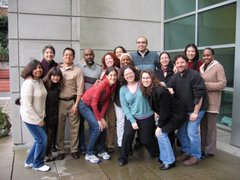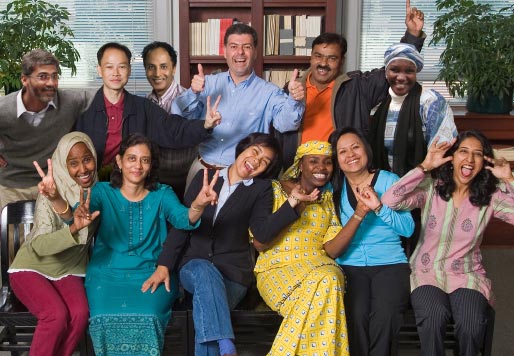
Lyrics by Sarah Frey with help from all IHP Coordinators from the last 20 years: Linda Lovick, Liz Mogford, Julie Beschta and Julie Brunett. James Pfeiffer on guitar. Sung to tune of "O-Bla-Di" by the Beatles.
O-Bla-Steve
Some-times he’s ex-e-cu-tive of HAI
Some-times he directs the IHP
Some-times he’s the go-to-guy for PLP
And soon he’ll be one of the Chairs of GHD
IHP, PLP, Fa-mi-ly, Bra!
How does Steve Gloyd do it all?
HAI, GHD, and Marim-ba!
Watchin’ all that basket-ball.
Rain or shine he always rides his bike to work
Birkenstocks and shirts from A-fri-ca
Home-made sandwich bread and pocket ca-len-dar
Evenings home with Salim, Mussa, and Ahou-a
O-bla-Steve, O-bla-da, life goes on, Bra!
How does Steve Gloyd do it all?
All those jobs, two huge boys, super wife, Ah!
Green hel-met in case he falls.
And in his of-fice you’ll find a few key things
(doo-doo, do…)
Big jar of mayo, some pisco sours
A suit and tie for high meetings
(ha ha ha ha ha ha ha)
Happy ever after spreading global health
Structural adjustment is the key
Turn the system round so folks can help them-selves
And put the money back into the Mi-ni-stry.
Obla-di, obla-da, life goes on, Bra!
How does Steve Gloyd do it all?
Mozambique, Cote d’Ivoire, and Sudan, ah!
Traveling from Fall to Fall.
And now he’s six-ty with de-cades left a-head.
(doo-doo, do, doo-doo…)
Because he bikes and runs up the stairs,
And hits the gym each nite, ‘fore bed
(ha ha ha ha ha ha ha)
Often he’ll hang out to chat and socialize,
(Email, cell phone, calendar in hand….)
Fam’ly man, a good friend, and musician too,
And always working hard to stick it to the man!
IHP, PLP, Fa-mi-ly, Bra!
How does Steve Gloyd do it all?
HAI, GHD, and Marim-ba!
Watchin’ all that basket-ball.
And if you want some fun…
(ha ha ha ha)
Sing O-Bla-Steve-Bla-Da!



















